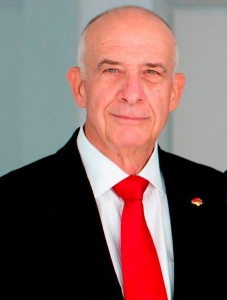Climate Change: Risks for National Security
| Date |
September 10th, 2015 |
| Time |
12:00pm – 1:00pm |
| Location |
Gill Center, E Costilla St, Colorado Springs, CO 80903 |
Today, the U.S. Navy is preparing for an open Arctic, the Marines are deploying in response to historic typhoons, and the Army is preparing its bases to use less energy than they produce.
Climate change is already a major consideration for US military planners. Meanwhile, American politicians continue to ignore the issue.
Join us for a discussion with senior flag officers as they discuss the steps the US military has taken and future implications for our national security.
To request an invitation, please follow the button below.

Speakers
Lt. General Dirk Jameson, USAF (Ret.)
 Lt. General Dirk Jameson, USAF (Ret.), served as Deputy Commander in Chief and Chief of Staff of U.S. Strategic Command before retiring from the U.S. Air Force in 1996 after more than three decades of active service. Gen. Jameson was responsible for directing the headquarters staff of 4,000 men and women and participating in numerous nuclear forums with the leaders of the Russian Federation Strategic Rocket Forces. Prior to his StratCom assignment, Gen. Jameson commanded the 14,500 men and women of the U.S. 20th Air Force, and was responsible for all U.S. Intercontinental Ballistic Missiles, seven major subordinate units, operational training, testing, security and readiness. Gen. Jameson also served as the Chief of Staff, Strategic Air Command and commanded the USAF Strategic Missile Center at Vandenberg AFB, California. There, he directed the activities of the Air Force’s third largest base, staffed with 10,000 military, civilian and contractor employees. General Jameson had numerous other nuclear related assignments including Director of Command Control, Strategic Air Command, 4th Air Division Commander and Commander of the 90th Strategic Missile Wing.
Lt. General Dirk Jameson, USAF (Ret.), served as Deputy Commander in Chief and Chief of Staff of U.S. Strategic Command before retiring from the U.S. Air Force in 1996 after more than three decades of active service. Gen. Jameson was responsible for directing the headquarters staff of 4,000 men and women and participating in numerous nuclear forums with the leaders of the Russian Federation Strategic Rocket Forces. Prior to his StratCom assignment, Gen. Jameson commanded the 14,500 men and women of the U.S. 20th Air Force, and was responsible for all U.S. Intercontinental Ballistic Missiles, seven major subordinate units, operational training, testing, security and readiness. Gen. Jameson also served as the Chief of Staff, Strategic Air Command and commanded the USAF Strategic Missile Center at Vandenberg AFB, California. There, he directed the activities of the Air Force’s third largest base, staffed with 10,000 military, civilian and contractor employees. General Jameson had numerous other nuclear related assignments including Director of Command Control, Strategic Air Command, 4th Air Division Commander and Commander of the 90th Strategic Missile Wing.
Since retiring from the Air Force, General Jameson has continued to serve in a number of private sector leadership positions. General Jameson received his undergraduate degree in Business Management from the University of Puget Sound, an MBA in Business Management from Ohio State University, and completed the Northwestern University Kellogg School of Business Program for Senior Executives. General Jameson graduated from the National War College and attended the Harvard University Kennedy School National Security Program for Senior Executives.
Lieutenant General John Castellaw, USMC (Ret.)
 John “Glad” Castellaw is the chief executive officer (CEO) of Farmspace Systems a provider of precision agriculture services and equipment in the Mid-South.
John “Glad” Castellaw is the chief executive officer (CEO) of Farmspace Systems a provider of precision agriculture services and equipment in the Mid-South.
Castellaw graduated from the University of Tennessee, Martin (UTM) in 1972 with a commission in the Marines and a degree in Agriculture. For 36 years he led Marines around the world while flying more than two dozen different types of aircraft. Castellaw served with the UN during the Siege of Sarajevo, commanded the American force in the multi-national security and stability operation in East Timor, and as the chief of staff for the U.S. Central Command at the height of the war in Iraq. His last tours were in the Pentagon where he oversaw Marine Aviation and then the Marine Corps budget.
In 2008, he returned to Tennessee where he operates the family farm, is a teaching fellow at UTM, and on the board of the Bank of Crockett. Castellaw is the president of the non-profit Crockett Policy Institute and is a senior associate with the Washington based Corvus Group. Other national security affiliations include membership on the Nuclear Security Working Group, the Climate Security Working Group, and the board of the American Security Project.
As a retired service member, Castellaw maintains a deep interest in National Security issues and in veterans’ affairs. He participates actively with various groups working to ensure this nation’s defense needs are met and serves on the Department of the Navy’s Naval Research Advisory Committee. As a veteran, he is a member of the Marine Corps League, The Marine Corps Association, and The Naval Institute and is beginning his first term as the National Commander of the Marine Corps Aviation Association.
Lt Colonel Hal Bidlack, Ph.D. (USAF, Ret.)
 Dr. Hal Bidlack has pursued a career-long goal of exploring the relationship between national security, environmental and energy policies.
Dr. Hal Bidlack has pursued a career-long goal of exploring the relationship between national security, environmental and energy policies.
He served as an Associate Professor at the United States Air Force Academy [USAFA] in Colorado Springs, where he taught for more than 17 years. He earned his Doctorate in Political Science at the University of Michigan in 1996 with a focus on American National Government and Environmental Security Issues. His dissertation titled “Swords as Plowshares: The Military’s Environmental Role” studied the relationship between military mission requirements and environmental constraints.
Dr. Bidlack received his commission as an Air Force officer in 1980 and retired from active service in 2006 as a Lieutenant Colonel. He twice served as a Director on the National Security Council at the White House, where he helped draft briefing materials, position papers and speeches for the President and Vice President. He served as Deputy Director of US Air Force Institute for National Security Studies, and was an Action Officer for the Strategic Arms Reduction Talks during duty at the Pentagon. His experience also includes a term as Deputy Director of Security Programs and Military Advisor for the Office of the Coordinator of US Assistance to the Former Soviet States at the US State Department, as well as service as a Military Policeman.
Dr. Bidlack’s career since retiring from active service with the Air Force includes a run for the U.S. Congress (Democratic Party nominee), service as Chair of his County’s Democratic Party and an appointment by the Governor of Colorado to the Judicial Performance Review Committee, and continuing to teach political science at USAFA as an Adjunct Professor. He also served as Program Chair for the Environmental Policy Panel at the Air Force Institute for National Security Studies.
Resources:
National Security and Climate Change – Perspectives from the Military
Security Impacts of Climate Change
Pay Now, Pay Later: A State-by-State Assessment of the Costs of Climate Change
ABOUT THE AMERICAN SECURITY PROJECT
The American Security Project is a non-profit, non-partisan public policy and research organization dedicated to fostering knowledge and understanding of a range of national security issues, promoting debate about the appropriate use of American power, and cultivating strategic responses to 21st century challenges. For more information, visit www.americansecurityproject.org.



 Lt. General Dirk Jameson, USAF (Ret.), served as Deputy Commander in Chief and Chief of Staff of U.S. Strategic Command before retiring from the U.S. Air Force in 1996 after more than three decades of active service. Gen. Jameson was responsible for directing the headquarters staff of 4,000 men and women and participating in numerous nuclear forums with the leaders of the Russian Federation Strategic Rocket Forces. Prior to his StratCom assignment, Gen. Jameson commanded the 14,500 men and women of the U.S. 20th Air Force, and was responsible for all U.S. Intercontinental Ballistic Missiles, seven major subordinate units, operational training, testing, security and readiness. Gen. Jameson also served as the Chief of Staff, Strategic Air Command and commanded the USAF Strategic Missile Center at Vandenberg AFB, California. There, he directed the activities of the Air Force’s third largest base, staffed with 10,000 military, civilian and contractor employees. General Jameson had numerous other nuclear related assignments including Director of Command Control, Strategic Air Command, 4th Air Division Commander and Commander of the 90th Strategic Missile Wing.
Lt. General Dirk Jameson, USAF (Ret.), served as Deputy Commander in Chief and Chief of Staff of U.S. Strategic Command before retiring from the U.S. Air Force in 1996 after more than three decades of active service. Gen. Jameson was responsible for directing the headquarters staff of 4,000 men and women and participating in numerous nuclear forums with the leaders of the Russian Federation Strategic Rocket Forces. Prior to his StratCom assignment, Gen. Jameson commanded the 14,500 men and women of the U.S. 20th Air Force, and was responsible for all U.S. Intercontinental Ballistic Missiles, seven major subordinate units, operational training, testing, security and readiness. Gen. Jameson also served as the Chief of Staff, Strategic Air Command and commanded the USAF Strategic Missile Center at Vandenberg AFB, California. There, he directed the activities of the Air Force’s third largest base, staffed with 10,000 military, civilian and contractor employees. General Jameson had numerous other nuclear related assignments including Director of Command Control, Strategic Air Command, 4th Air Division Commander and Commander of the 90th Strategic Missile Wing.
 Dr. Hal Bidlack has pursued a career-long goal of exploring the relationship between national security, environmental and energy policies.
Dr. Hal Bidlack has pursued a career-long goal of exploring the relationship between national security, environmental and energy policies.



